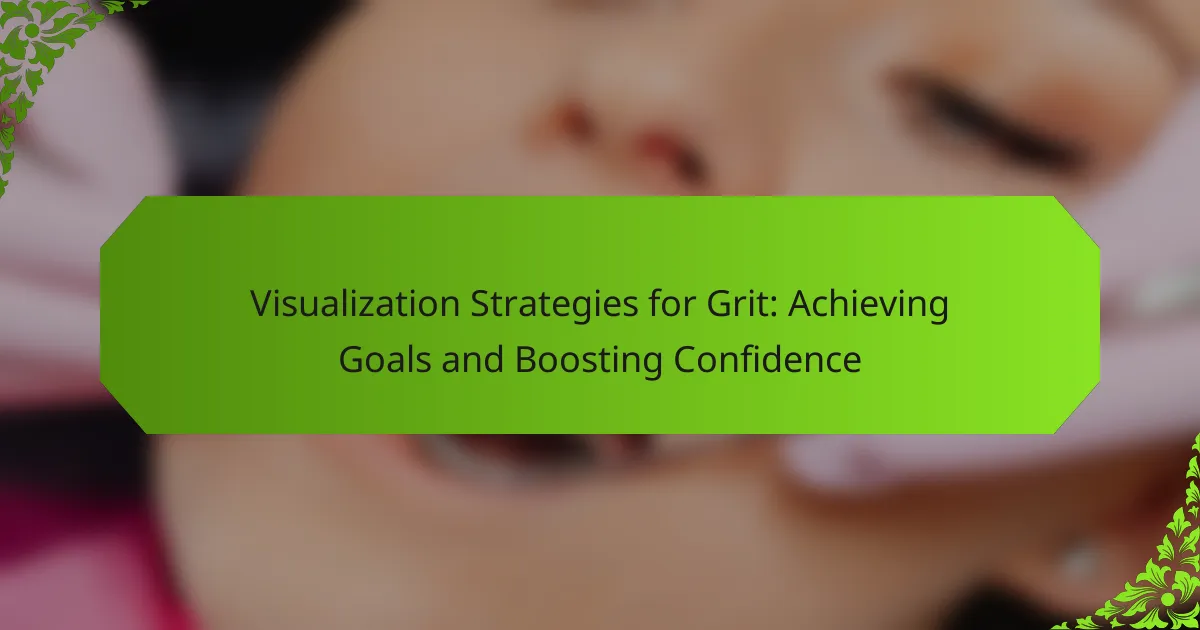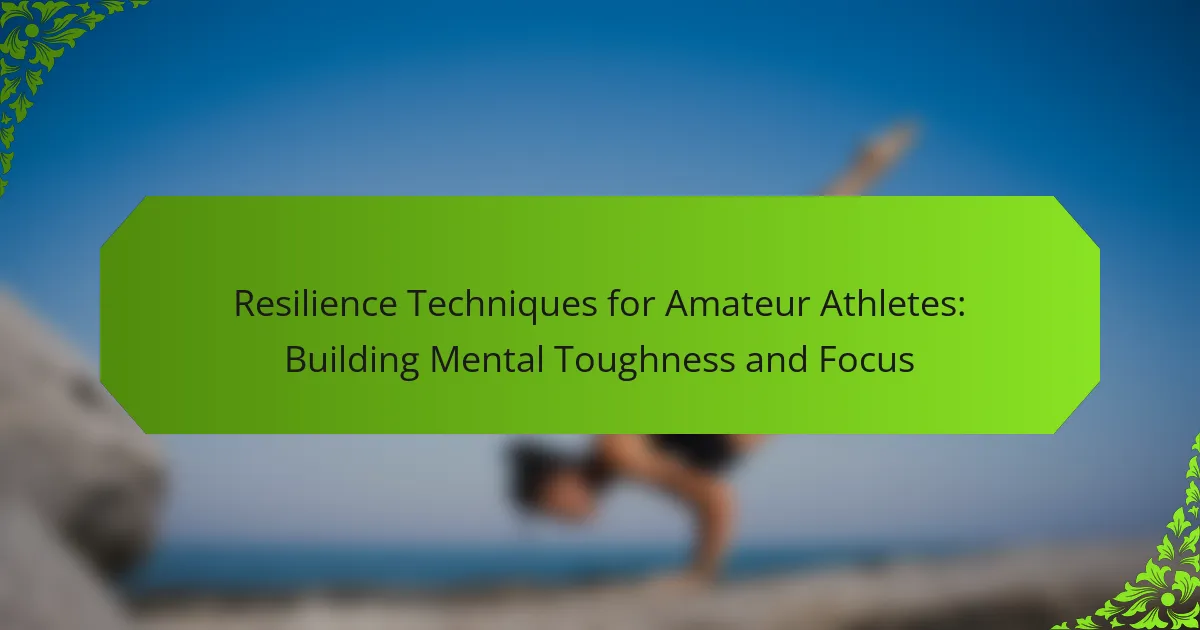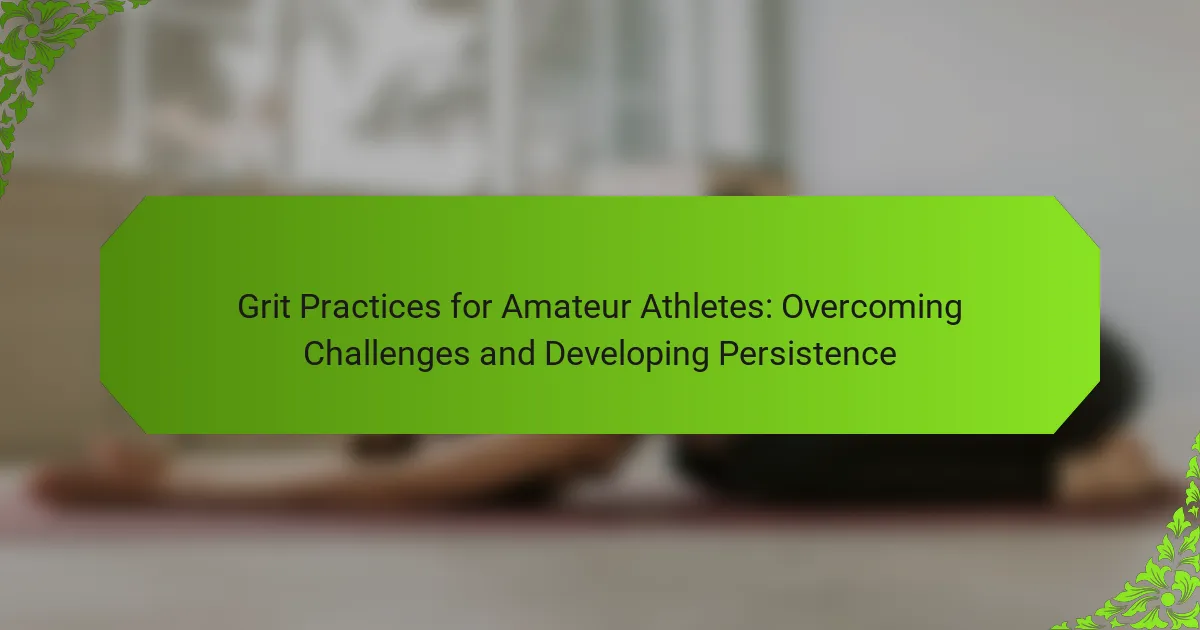Mindfulness techniques can significantly enhance resilience by improving emotional regulation and stress management. Key practices include mindful breathing, body scanning, and gratitude journaling. Rare methods such as forest bathing and sound meditation also contribute to emotional well-being. Adapting these techniques to cultural contexts and integrating them into daily routines can further bolster their effectiveness.
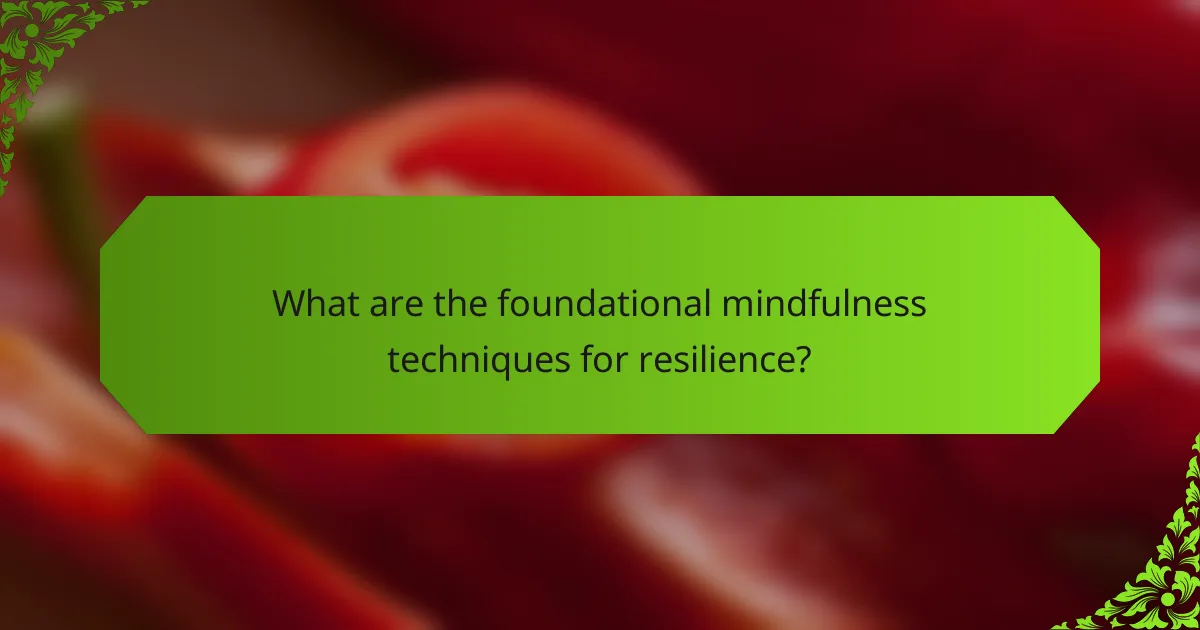
What are the foundational mindfulness techniques for resilience?
Mindfulness techniques for resilience include practices that enhance emotional regulation and stress management. Key techniques are mindful breathing, body scanning, and mindful observation. These practices improve focus, promote relaxation, and foster a sense of control. Regular application can lead to increased resilience in challenging situations.
How does mindfulness enhance performance in high-pressure situations?
Mindfulness significantly enhances performance in high-pressure situations by fostering focus and reducing anxiety. Techniques such as deep breathing and meditation help individuals maintain composure, enabling better decision-making. Research indicates that mindfulness can improve cognitive flexibility, allowing for quicker adjustments to changing circumstances. This enhanced mental resilience leads to improved outcomes in both personal and professional settings.
What role does mindfulness play in reducing stress levels?
Mindfulness significantly reduces stress levels by enhancing emotional regulation and promoting relaxation. Techniques such as meditation and deep breathing encourage present-moment awareness, which helps individuals manage stress responses effectively. Research indicates that regular mindfulness practice can lower cortisol levels, leading to decreased anxiety. Additionally, mindfulness fosters resilience, allowing individuals to cope better with challenges and maintain performance under pressure.
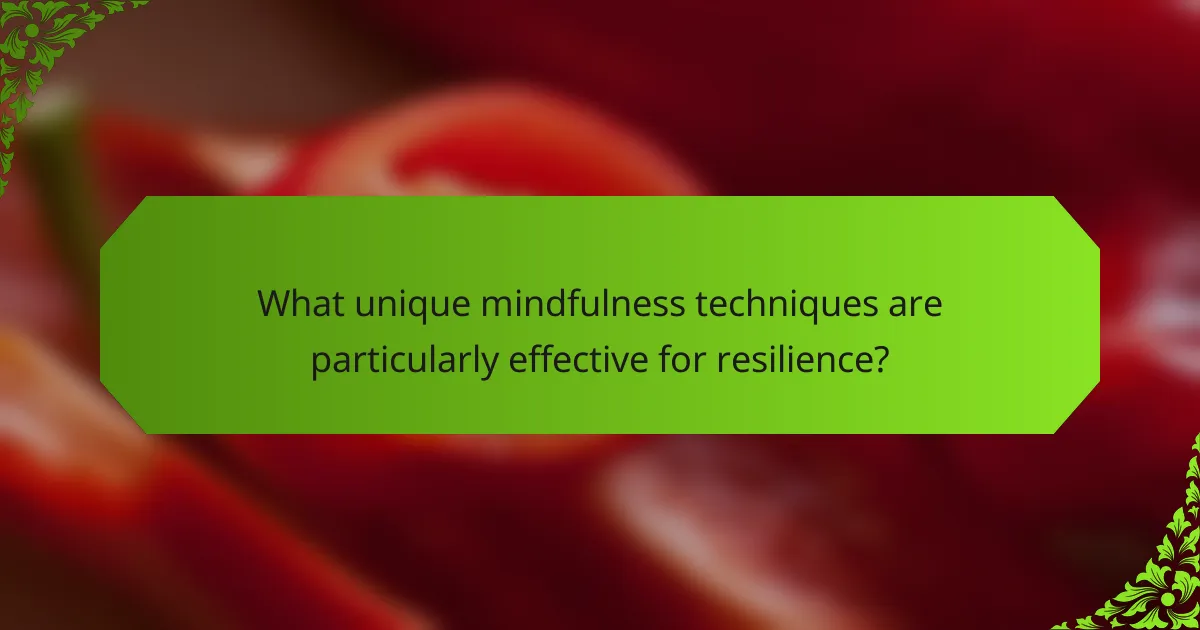
What unique mindfulness techniques are particularly effective for resilience?
Mindfulness techniques like body scanning, mindful breathing, and gratitude journaling effectively enhance resilience. Body scanning fosters awareness of physical sensations, helping individuals process stress. Mindful breathing reduces anxiety by anchoring attention to the present moment. Gratitude journaling cultivates a positive mindset, promoting emotional strength during challenging times. These unique approaches empower individuals to manage stress and improve overall performance.
How can visualization techniques improve mental resilience?
Visualization techniques significantly enhance mental resilience by improving focus and reducing stress. These techniques allow individuals to mentally rehearse success, leading to increased confidence and performance. Regular practice can create a positive feedback loop, reinforcing coping strategies during challenging situations. For example, athletes often use visualization to prepare for competitions, which can translate to better outcomes in high-pressure environments. This method not only builds mental strength but also fosters a proactive approach to stress management.
What is the impact of mindful breathing on stress management?
Mindful breathing significantly reduces stress by promoting relaxation and enhancing emotional regulation. This technique encourages focus on the present moment, which can lower cortisol levels. Studies show that regular practice leads to improved mental clarity and resilience. Mindful breathing also fosters a greater sense of control over one’s thoughts and reactions, contributing to overall well-being.
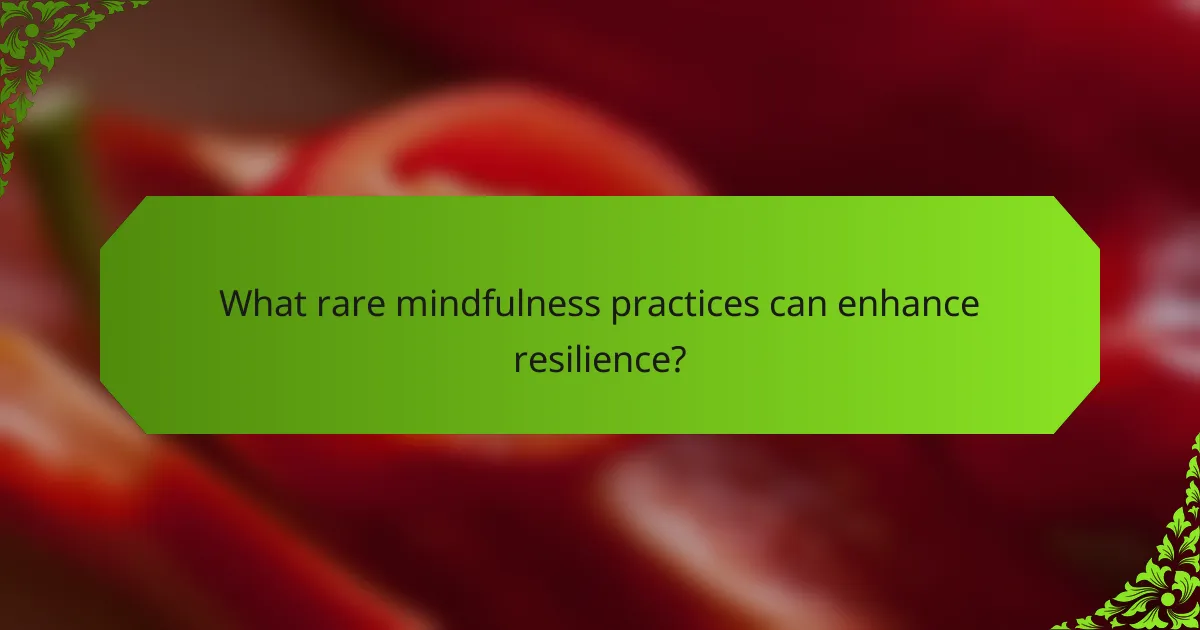
What rare mindfulness practices can enhance resilience?
Rare mindfulness practices that can enhance resilience include forest bathing, sound meditation, and breathwork. Forest bathing, or shinrin-yoku, immerses individuals in nature, promoting stress reduction and emotional well-being. Sound meditation utilizes vibrations from instruments to foster deep relaxation and mental clarity. Breathwork techniques, such as box breathing, enhance focus and emotional regulation. Each practice uniquely contributes to building resilience by addressing stress and improving mental health.
How does nature immersion influence mindfulness and resilience?
Nature immersion significantly enhances mindfulness and resilience by promoting a deep connection with the environment. Spending time in nature reduces stress and fosters mental clarity, leading to improved emotional regulation. Research indicates that individuals exposed to natural settings report higher levels of well-being and lower anxiety. Nature’s calming effects can enhance focus and creativity, essential components for resilience. Engaging in mindful practices during nature immersion, such as observing surroundings or deep breathing, further amplifies these benefits, creating a holistic approach to stress management and personal growth.
What are the benefits of integrating art therapy into mindfulness practices?
Integrating art therapy into mindfulness practices enhances emotional expression, reduces anxiety, and fosters resilience. These benefits arise from art therapy’s unique ability to engage individuals creatively, promoting self-discovery and stress relief. Studies indicate that combining these approaches can lead to improved mental health outcomes, as participants often report increased feelings of well-being and a greater sense of control. Additionally, art therapy can facilitate deeper mindfulness experiences by encouraging present-moment awareness through creative processes.
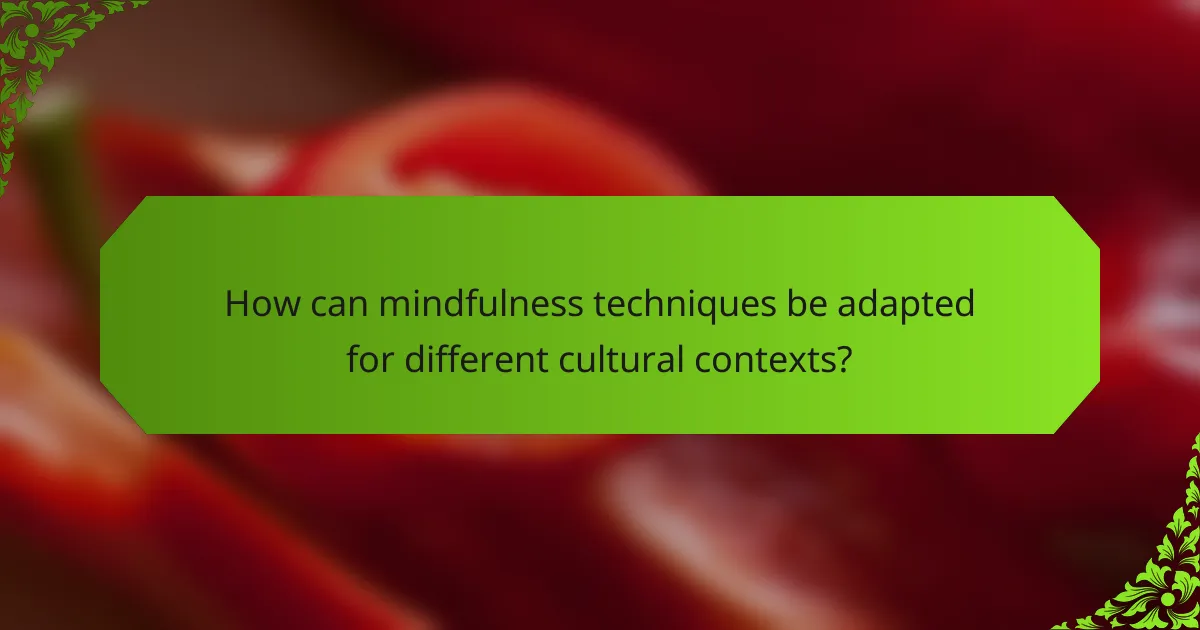
How can mindfulness techniques be adapted for different cultural contexts?
Mindfulness techniques can be effectively adapted for different cultural contexts by integrating local traditions and values. Tailoring practices to resonate with cultural beliefs enhances acceptance and effectiveness. For instance, incorporating indigenous practices or community rituals can foster a deeper connection to mindfulness. Additionally, understanding cultural attitudes toward mental health is crucial; some cultures may prioritize collective well-being over individual practices. Research indicates that culturally adapted programs lead to improved outcomes and greater resilience in participants. By respecting and integrating these cultural nuances, mindfulness techniques become more relevant and impactful.
What are the specific mindfulness practices popular in various regions?
Mindfulness practices vary by region, each offering unique techniques. In Asia, meditation and breath control are prevalent, emphasizing inner peace. Western cultures often incorporate mindfulness into daily activities, such as mindful eating and walking. Indigenous cultures may use nature-based practices, connecting deeply with the environment. African traditions often emphasize communal mindfulness through storytelling and rituals. Each approach enhances resilience, performance, and stress reduction uniquely.
How do local cultural perceptions influence the adoption of mindfulness techniques?
Local cultural perceptions significantly shape the acceptance and practice of mindfulness techniques. Cultural values and beliefs influence how individuals view stress management and personal well-being. For instance, in cultures that prioritize collectivism, mindfulness may be integrated into community practices, enhancing its appeal. Conversely, in individualistic societies, personal achievement might drive mindfulness adoption, focusing on self-improvement. Furthermore, unique cultural rituals can enrich mindfulness practices, making them more relatable and effective. Understanding these dynamics fosters better implementation of mindfulness techniques across diverse populations, ultimately enhancing resilience and performance.
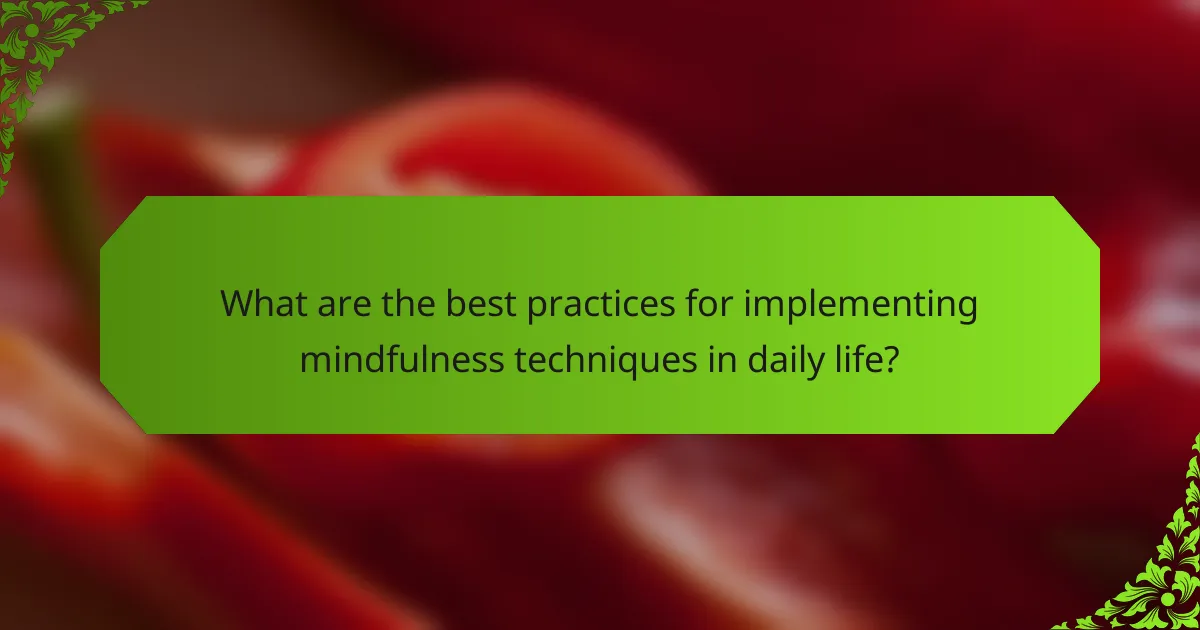
What are the best practices for implementing mindfulness techniques in daily life?
To effectively implement mindfulness techniques in daily life, focus on consistency and integration. Start by dedicating a few minutes each day to mindfulness practices, such as meditation or deep breathing exercises. Gradually incorporate mindfulness into daily tasks, like eating or walking, to enhance awareness and reduce stress.
Engaging in mindfulness during challenging situations can build resilience and improve performance. For instance, taking a moment to breathe deeply before responding to stressors can lead to more thoughtful reactions.
Establishing a routine can help reinforce these practices. Consider setting reminders or using mindfulness apps to guide your sessions. Regular practice not only cultivates mindfulness but also fosters a greater sense of well-being.
Lastly, reflect on your experiences to identify what techniques work best for you. This personalized approach can enhance the effectiveness of mindfulness in your daily life.
What common mistakes should be avoided when practicing mindfulness for resilience?
To practice mindfulness for resilience effectively, avoid common mistakes that hinder progress. First, neglecting consistency can undermine the benefits. Practicing mindfulness sporadically limits its impact on stress reduction. Second, focusing too much on achieving a specific outcome can lead to frustration. Mindfulness is about the process, not just results. Third, ignoring the importance of a conducive environment can distract from practice. A calm space enhances focus and effectiveness. Lastly, judging thoughts during practice can create resistance. Accepting thoughts without judgment fosters a more resilient mindset.
How can individuals measure the effectiveness of their mindfulness practices?
Individuals can measure the effectiveness of their mindfulness practices through self-assessment and tracking specific metrics. Key indicators include emotional regulation, stress levels, and overall well-being.
1. Journaling: Regularly document feelings and thoughts to identify patterns and improvements.
2. Mindfulness apps: Use apps that track meditation duration and frequency, providing insights into progress.
3. Stress assessments: Periodically evaluate stress through standardized questionnaires to gauge changes over time.
4. Performance metrics: Observe improvements in focus, productivity, and resilience in challenging situations.
These methods allow individuals to evaluate their mindfulness journey effectively, enhancing their resilience and performance.
What tools can assist in tracking mindfulness progress?
Mindfulness apps and journals can effectively track mindfulness progress. Popular tools include Headspace, Calm, and Insight Timer, which offer guided meditations and progress tracking features. Journaling can also provide insights into emotional changes and mindfulness practices. Regular use of these tools enhances resilience and reduces stress.
What expert insights can enhance the practice of mindfulness for resilience?
Mindfulness techniques enhance resilience by promoting emotional regulation and stress reduction. Practicing mindfulness improves focus, fosters self-awareness, and encourages a positive mindset. Techniques such as meditation, deep breathing, and body scans cultivate present-moment awareness, which can significantly reduce anxiety. Regular practice can lead to long-term benefits, including increased adaptability in challenging situations.
